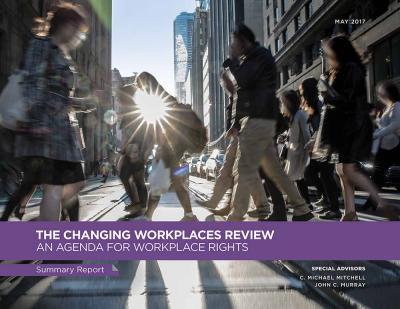July 12, 2017
Interim report proposes sweeping changes to employment laws
 An interim report proposes 173 recommendations to Ontario’s Employment Standards Act, 2000 (ESA) and Labour Relations Act, 1995, some of which may have a significant impact on green professionals in Ontario if passed in the provincial legislature.
An interim report proposes 173 recommendations to Ontario’s Employment Standards Act, 2000 (ESA) and Labour Relations Act, 1995, some of which may have a significant impact on green professionals in Ontario if passed in the provincial legislature.In February 2015, the Ministry of Labour (MOL) initiated the Changing Workplaces Review, building on the government commitments in the 2014 Throne Speech. The review aims to update employment law in light of the changing nature of the workforce, the economy and in response to global and technological changes, among other factors.
Released in May, The Changing Workplaces Review made specific recommendations on scheduling, foreign workers, seasonal and part-time employees, vacation pay and holidays.
Scheduling
Under the proposals, employees would have the right to request schedule or location changes after having been employed for three months, without fear of reprisal. Employees who regularly work more than three hours per day, but upon reporting to work are given less than three hours, would be paid three hours at their regular rate of pay. Also, if a shift is cancelled within 48 hours of its start, employees must be paid three hours at their regular rate. Employees would be given the right to refuse to accept shifts without repercussion if their employer makes the request with less than four days’ notice. When employees are “on-call” and not called in to work, they must be paid three hours at their regular rate of pay. This would be required for each 24 hour period that employees are on-call.If the proposed legislation passes, scheduling changes would come into force Jan. 1, 2019.
Temporary foreign workers
The review recommends the MOL work to develop a procedure to address alleged reprisals that result in termination or unjust dismissal for temporary foreign workers prior to repatriation under the terms of their work permit.Part-time and seasonal employees
Ontario’s minimum wage is currently $11.40 per hour and is scheduled increase to $11.60 on Oct. 1. The review proposed the elimination of minimum wage for students under 18 over a three-year time frame. The review also recommends no employee shall be paid a lower rate than a comparable full-time employee unless there is a difference in seniority, merit or production-based system.Overtime pay
Under the proposed legislation, employees who hold more than one position with an employer and who are working overtime, must be paid at the rate for the position they are working during the overtime period. If the proposed legislation passes, this proposal would come into force Jan. 1, 2018.Employee misclassification
The interim report proposed legislation that would prohibit employers from misclassifying employees as “independent contractors.” This is intended to address cases where employers improperly treat their employees as if they are self-employed and not entitled to the protections of the ESA. Employers that misclassify their employees could be subject to penalties including prosecution, public disclosure of a conviction and monetary penalties.If the proposed legislation passes, this proposal would come into force immediately.
Paid vacation
Employees would be entitled to three weeks of paid vacation after five years of service with the same employer. If passed, this proposal would come into force Jan. 1, 2018.Public holiday pay
The formula for calculating public holiday pay would be simplified so that employees are entitled to their average regular daily wage. If passed, this proposal would come into force on Jan. 1, 2018.Collective bargaining
The review also recommended certain restrictions on strikes and lock-outs involving agricultural and horticultural employees, or any persons employed on a “family farm” where a collective bargaining agreement may be in place.For a complete summary of the proposed legislation, read a summary of the review and the proposed changes by the Ontario government.
READ THE REVIEW
READ THE GOVERNMENT PROPOSAL